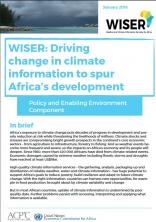WISER: Driving change in climate information to spur Africa’s development

Africa’s exposure to climate change puts decades of progress in development and poverty reduction at risk while threatening the livelihoods of millions. Climate shocks and stresses are compromising bright growth prospects in the continent’s core economic sectors – from agriculture to infrastructure, forestry to fishing. And as weather events be-come more frequent and severe, so the impacts on Africa’s economy and its people will deepen. Since 1980, more than 420 000 Africans have died from climate-related events. Economic damages caused by extreme weather including floods, storms and droughts have reached at least US$9bn.High quality climate information services – the gathering, analysis, packaging-up and distribution of reliable weather, water and climate information – has huge potential to support Africa’s goals to reduce poverty, build resilience and adapt to future climate change. With the right information, countries can harness new opportunities, for example in food production, brought about by climate variability and change. But in most African countries, uptake of climate information is undermined by poor quality data. Further problems persist with accessing, interpreting and applying what information is available.